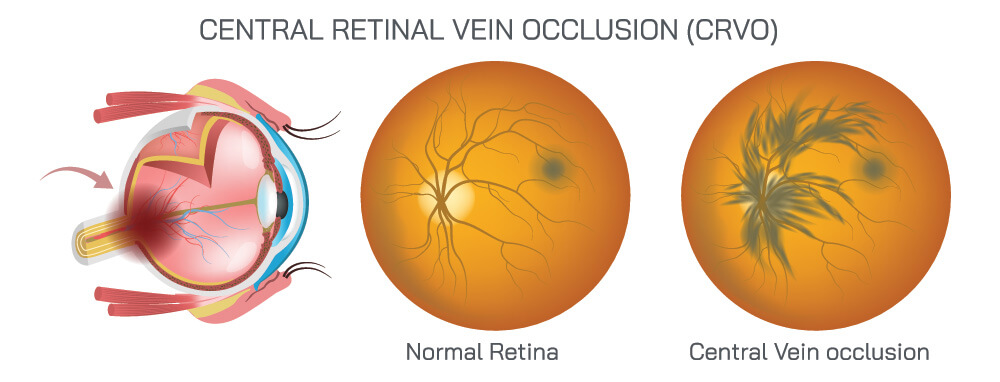Retinal Vein Occlusion
The retina—the layer of light-sensitive cells at the back of the eye—is nourished by the flow of blood, which provides nutrients and oxygen that nerve cells need. When there is a blockage in the veins into the retina, retinal vein occlusion may occur. This blockage can impact the entire retina if it occurs in the central vein which is located at the optic nerve (which is known as central retinal vein occlusion) or in a portion of the retina if it occurs in small veins that branch off of the central vein (which is known as branch retinal vein occlusion).
The blockage causes the walls of the vein to leak blood and excess fluid into the retina. When this fluid collects in the macula (the area of the retina responsible for central vision), vision becomes blurry.

Symptoms
The most common symptom of a retinal vein occlusion is vision loss or blurring in part or all of one eye. The vision loss or blurring is painless and may happen suddenly or become worse over several hours or days. Sometimes there is a sudden and complete loss of vision. In severe cases the blocked vein may cause painful pressure in the eye. If you experience any of these symptoms, you should contact your OCB ophthalmologist immediately.
Floaters in your vision are another symptom that may occur. When retinal blood vessels are not working properly, the retina grows new, fragile vessels that can bleed into the vitreous, the fluid that fills the center of the eye. Blood in the vitreous clumps and is seen as tiny dark spots, or floaters, in the field of vision.
Retinal vein occlusions are associated with aging and are usually diagnosed in people who are age 50 and older. High blood pressure, diabetes and glaucoma may increase your risk for developing this condition.
Treatment
The OCB Retina Center offers specialized care for retinal vein occlusions. Should you experience sudden vision loss or blurring or any of the symptoms above, it is important to seek immediate medical attention from your OCB ophthalmologist. He or she will conduct a thorough examination to determine if you have a retinal vein occlusion.
Because there is no cure for branch retinal vein occlusion, the main goal of treatment is to stabilize vision by sealing off leaking blood vessels that interfere with proper functioning of the macula and cause macular edema. Treatments may include laser treatment and injection of anti-VEGF or steroid medications. Retinal vein occlusion is an ongoing condition. Your OCB ophthalmologist will want to monitor your condition over time to minimize the impact it has on your vision.
